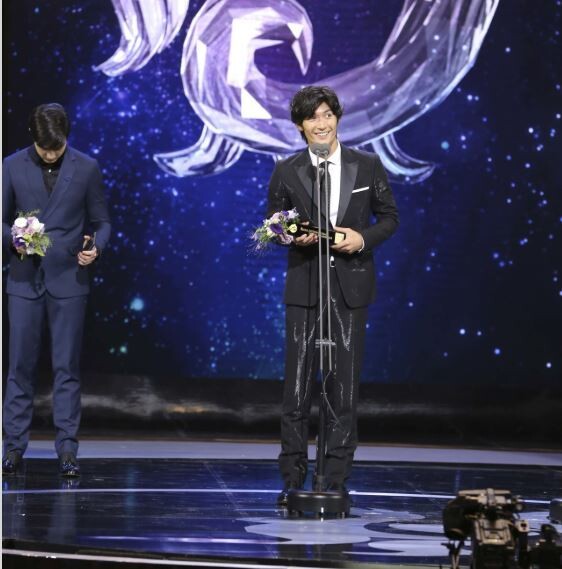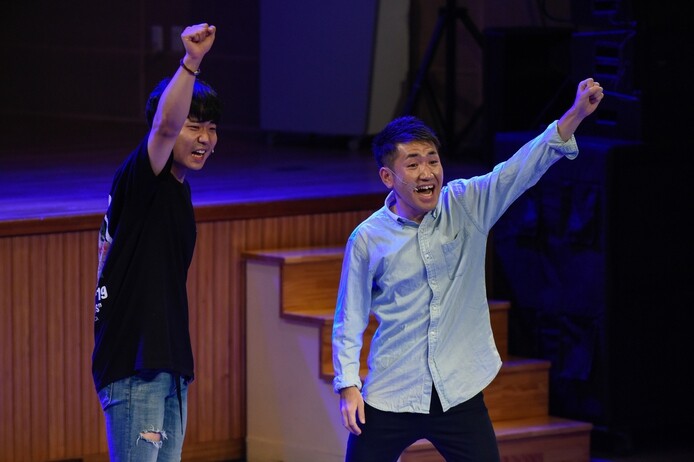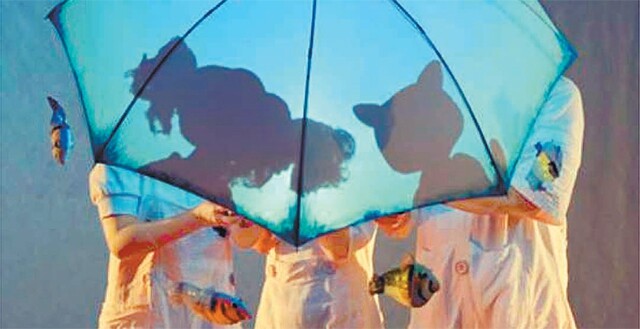hankyoreh
Links to other country sites 다른 나라 사이트 링크
S. Korea-Japan cultural exchange continues despite souring diplomatic relations

“As neighboring countries, we occasionally run into some problems. But I believe that, if we make an effort to understand each other a little better, we’ll be able to deal with those problems together.”
The remarks made by Japanese actor Miura Haruma after receiving the Asian Male Star Prize at the 2019 Seoul Drama Awards on Aug. 28 are fraught with significance. Though Haruma didn’t mention the phrase “South Korea-Japan relations,” his desire for the two countries to normalize their relations was evident throughout his speech, which lasted just over two minutes.
“I believe entertainment has the power to connect people,” Miura said. “In the future, I would like to contribute more to strengthening Asia as a whole through my artistic endeavors. The fact that I am here receiving this prize only makes me respect and love South Korea more.”
Having made his debut as a child actor in 1997, Haruma Miura is one of Japan’s most popular actors. Among South Koreans, he is well known as the star of “Two Weeks,” a remake of a South Korean series that is currently being broadcast on Fuji TV. It is not easy for a famous Japanese actor to publicly speak out about relations with South Korea at a sensitive moment like the current one. Miura’s remarks are drawing all the more attention because of his past appearances in films that have attracted controversy over right-wing elements, including “Attack on Titan” and “The Eternal Zero.”

“With anti-Korean sentiment growing in Japan, we were actually been a bit worried the actor might suffer a backlash for his award remarks,” said a Drama Awards official. “It’s surprising for a popular Japan actor to make remarks like that.”
Even with South Korea-Japan relations souring by the day, calls for ongoing cultural exchange continue. Analysts suggested that with the two sides having gained experience sharing culture over many years since full-scale cultural openness was initiated in 1998, this could be used as a key to relieving the chill that has descended over them. During a closed-door bilateral meeting in Incheon on Aug. 29, South Korean Culture Minister Park Yang-woo and his Japanese counterpart Masahiko Shibayama emphasized that “cultural exchange between South Korea and Japan will continue.”
South Korean and Japanese comedians have also taken the stage together. Kokoon, a five-member comedy group including South Korean and Japanese members, participated in the performance “Kokoon and Worldwide” on Aug. 24–25 with Wes-P and Akira Continental Fever – acts associated with Japan’s biggest comedians’ agency, Yoshimoto Entertainment – at the 7th Busan International Comedy Festival, which ran through Sept. 1. The performers carried on with the event despite the organizers showing excessive caution by removing the performance description from the program book and changing the original title “Kokoon and Yoshimoto” as South Korea-Japan relations soured. Akira Continental Fever, who brought smiles to audience members’ faces with amusing magic tricks, clearly showed his affection for South Korea, lifting the Taegukgi flag during performances and showing a placard reading “I love Korea.” After the performance, Kokoon’s South Korean and Japanese members said, “We hope relations will improve after this performance.” While the audience was only around 100 people, an official with Yoshimoto Entertainment’s South Korea office said, “The Japanese comedians are grateful for the support from viewers despite the poor situation right now in bilateral relations.”
“They felt that they should carry on with the performances in the interests of cultural exchange,” the official added.
Examples of South Korea and Japan working together in pursuit of the global stage have also been taking place in the theater world.
“Secret of Lulu Island,” a puppet show co-developed by the South Korean puppeteering group Artstage San and the Japanese shadow play group Kakashi-za and presented until Aug. 25 at Seoul Arts Center, was based on ideas shared between the two groups over a five-year period after beginning exchanges in 2012. The show is jointly directed, with two performers each from South Korea and Japan. Following its March debut in Japan and the August performances in Seoul, the performance will be held in Gwacheon, Incheon, and elsewhere in September and October before a staging next May at the International Association of Theatre for Children and Young People (ASSITEJ) world congress.

K-pop and the Korean Wave’s contribution to cultural exchange with Japan
South Korean cultural content first began spreading through Asia with the “Korean Wave” touched off in Japan by the drama “Winter Sonata” in the early 2000s. This served as a springboard for growth that has resulted in “K-culture” achieving global stature. A statistical survey of the cultural content industry (including publishing, film, games, and music) in 2017 by the Korea Creative Content Agency (KOCCA) showed South Korea surpassing Japan in terms of cultural content with US$1,655,975,000 in exports to Japan – seven to eight times the US$214,086,000 in imports from Japan. Experts have argued that cultural exchange needs to be put to work to defuse the political and economic tensions that have arisen between the two sides. While South Korea continues to be targeted in the wake of a Supreme Court ruling on forced labor conscription in October of last year – including the TV Asahi’s network cancellation of a performance by BTS – it was also the voices of the group’s “Army” members in Japan that enabled them to stage a Tokyo performance.
“Cultural exchange between South Korea and Japan needs to proceed separately from politics or the economy,” argued Kim Gyeong-hwan, a professor of media and advertising studies at Sangji University.
“South Korea has the leadership when it comes to culture, so we have no need to refuse to take part in cultural events,” he argued.
“The battle lines should be restricted to the economy.”
By Nam Ji-eun, staff reporter
Please direct comments or questions to [english@hani.co.kr]

Editorial・opinion
![[Column] Park Geun-hye déjà vu in Yoon Suk-yeol [Column] Park Geun-hye déjà vu in Yoon Suk-yeol](https://flexible.img.hani.co.kr/flexible/normal/500/300/imgdb/original/2024/0424/651713945113788.jpg) [Column] Park Geun-hye déjà vu in Yoon Suk-yeol
[Column] Park Geun-hye déjà vu in Yoon Suk-yeol![[Editorial] New weight of N. Korea’s nuclear threats makes dialogue all the more urgent [Editorial] New weight of N. Korea’s nuclear threats makes dialogue all the more urgent](https://flexible.img.hani.co.kr/flexible/normal/500/300/imgdb/original/2024/0424/7317139454662664.jpg) [Editorial] New weight of N. Korea’s nuclear threats makes dialogue all the more urgent
[Editorial] New weight of N. Korea’s nuclear threats makes dialogue all the more urgent- [Guest essay] The real reason Korea’s new right wants to dub Rhee a founding father
- [Column] ‘Choson’: Is it time we start referring to N. Korea in its own terms?
- [Editorial] Japan’s rewriting of history with Korea has gone too far
- [Column] The president’s questionable capacity for dialogue
- [Column] Are chaebol firms just pizza pies for families to divvy up as they please?
- [Column] Has Korea, too, crossed the Rubicon on China?
- [Correspondent’s column] In Japan’s alliance with US, echoes of its past alliances with UK
- [Editorial] Does Yoon think the Korean public is wrong?
Most viewed articles
- 1‘We must say no’: Seoul defense chief on Korean, USFK involvement in hypothetical Taiwan crisis
- 2Will NewJeans end up collateral damage in internal feud at K-pop juggernaut Hybe?
- 3[Column] Park Geun-hye déjà vu in Yoon Suk-yeol
- 4Why Korea shouldn’t welcome Japan’s newly beefed up defense cooperation with US
- 5Thursday to mark start of resignations by senior doctors amid standoff with government
- 6N. Korean hackers breached 10 defense contractors in South for months, police say
- 7[Guest essay] The real reason Korea’s new right wants to dub Rhee a founding father
- 8[Column] ‘Choson’: Is it time we start referring to N. Korea in its own terms?
- 9Kim Jong-un expressed ‘satisfaction’ with nuclear counterstrike drill directed at South
- 10[Editorial] New weight of N. Korea’s nuclear threats makes dialogue all the more urgent